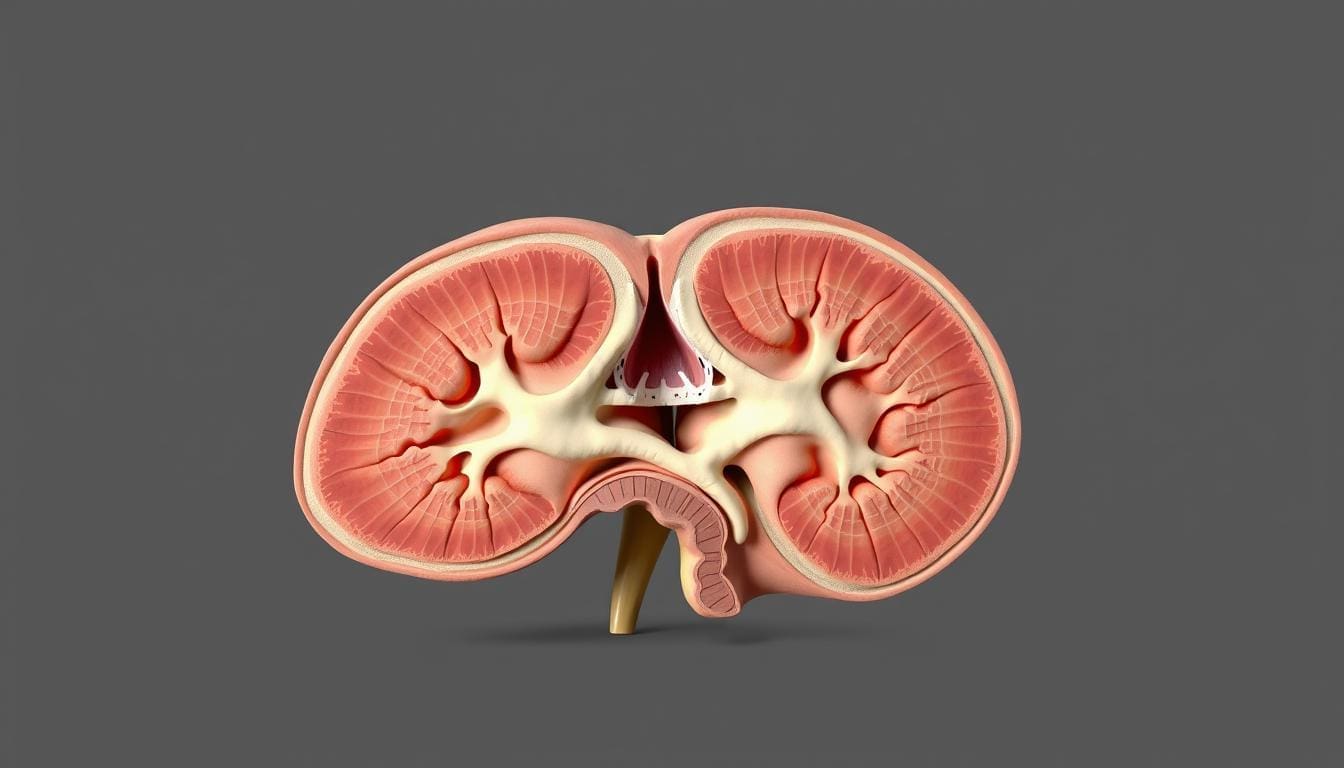Last Updated on November 26, 2025 by Bilal Hasdemir

Adrenal cortex carcinoma is a rare and aggressive cancer. It starts in the outer layer of the adrenal gland. This disrupts normal hormone production, causing various symptoms. At Liv Hospital, we know how complex this condition is. We’re dedicated to giving personalized care.
Our team of specialists is committed to top-notch medical care. We make sure our patients get the best results. We use the latest medical protocols to treat rare cancer effectively.
It’s important to know the differences between adrenal cortex carcinoma and other adrenal gland tumors. Our experts are ready to offer advanced, individualized care. They help patients with hormonal imbalances caused by this condition.
Key Takeaways
- Adrenal cortex carcinoma is a rare and aggressive cancer.
- It originates in the outer layer of the adrenal gland.
- Proper diagnosis is key to tell it apart from other adrenal tumors.
- Liv Hospital offers personalized care and the latest treatments.
- Our team is focused on delivering world-class medical care.
Understanding the Adrenal Glands: Structure and Function
The adrenal glands are key to our body’s endocrine system. They sit on top of each kidney. These glands have two main parts: the outer cortex and the inner medulla.
Anatomy of the Adrenal Glands
The adrenal glands are complex organs that keep our body balanced. The adrenal cortex, the outer layer, makes important hormones.
The glands have two main parts: the cortex and the medulla. The cortex makes hormones like cortisol and aldosterone. These hormones help with metabolism, blood pressure, and keeping the right balance of electrolytes.
The Role of the Adrenal Cortex
The adrenal cortex makes vital hormones. Cortisol is one of them. It helps our body deal with stress.
The cortex also makes corticosteroids, including cortisol and aldosterone. These hormones are key for blood pressure, stress response, and electrolyte balance.
Normal Hormone Production and Regulation
The production of hormones by the adrenal cortex is controlled by the HPA axis. This system makes sure hormone levels stay healthy.
The HPA axis manages cortisol and other corticosteroids. If this system gets disrupted, it can cause hormonal imbalances. This can lead to problems like adrenal gland tumors and cancer.
What Is Adrenal Cortex Carcinoma?
Adrenal cortex carcinoma is a rare and aggressive cancer. It starts in the adrenal cortex, which is part of the adrenal gland. This gland is important for making hormones that help our body work right.
This cancer is serious because it’s hard to treat. It can mess up how our body makes hormones.
Definition and Characteristics
Adrenal cortex carcinoma starts in the cortex of the adrenal gland. The adrenal gland makes hormones like cortisol and aldosterone. These hormones help with things like metabolism and blood pressure.
Cancer cells in the adrenal cortex can mess up hormone production. This can cause many health problems.
These tumors grow fast and are often big by the time they are found. They can spread to other parts of the body. This makes it hard to treat them.
Incidence and Epidemiology
Adrenal cortex carcinoma is rare, happening to about 1 in a million people each year. It can happen to anyone, but most often in people in their 40s and 50s.
Studies show it happens a bit more often in women than men. Why this is isn’t clear yet. But it shows we need to learn more about this disease.
Risk Factors and Predisposing Conditions
We don’t know all the causes of adrenal cortex carcinoma. But some genetic syndromes and environmental factors might play a part. Genetic conditions like Li-Fraumeni and Beckwith-Wiedemann syndrome increase the risk.
Other possible risks include toxins and radiation. But we need more research to be sure. Knowing these risks helps us find it early and prevent it.
Types of Adrenal Tumors: A Complete Overview
It’s important to know about the different types of adrenal tumors for the right diagnosis and treatment. These tumors can be benign or cancerous and come from various parts of the adrenal gland. At Liv Hospital, we use the latest diagnostic tools to find and treat these tumors. This ensures our patients get the best care possible.
Benign Adrenal Adenomas
Benign adrenal adenomas are common types of adrenal tumors. They are often found by chance during tests for other reasons. Most adenomas don’t make hormones, but some can, causing hormonal imbalances. Early detection is key to avoid problems.
Pheochromocytomas and Paragangliomas
Pheochromocytomas are rare tumors from the adrenal medulla, while paragangliomas happen outside the gland. These tumors can make too much of certain hormones, causing high blood pressure and fast heart rate. Getting the right diagnosis is vital for managing these conditions.
Adrenal Medullary Tumors
Adrenal medullary tumors, like pheochromocytomas, start from the chromaffin cells in the adrenal medulla. They can be benign or cancerous and cause big hormonal problems. We use detailed tests to tell these tumors apart from other adrenal issues.
Metastatic Tumors to the Adrenal Gland
The adrenal glands can also host metastases from cancers like lung, breast, and kidney. Metastatic tumors in the adrenal gland are more common than primary adrenal cancers. Finding the original cancer is important for the right treatment plan.
How Adrenal Cortex Carcinoma Differs From Other Adrenal Tumors
It’s key to tell adrenal cortex carcinoma apart from other adrenal tumors for the best care. At Liv Hospital, we focus on precise diagnosis. We use a detailed method to spot adrenal cortex carcinoma.
Size and Growth Pattern Differences
Adrenal cortex carcinoma grows bigger and faster than benign tumors. These tumors can push against nearby tissues or organs.
These tumors can be 4 to 20 cm in size, with an average of 10 cm. Benign tumors, on the other hand, are usually under 4 cm.
Hormonal Activity Variations
Adrenal cortex carcinoma makes too much hormone, causing symptoms. Common issues include Cushing’s syndrome, virilization, and feminization.
We check hormone levels like cortisol, aldosterone, and androgens. This helps us tell it apart from other tumors that might not make hormones or make different ones.
Imaging Characteristics
Imaging is vital for spotting the difference. We use CT scans, MRI, and PET scans to see the tumor’s size, shape, and activity.
Adrenal cortex carcinoma shows up as irregular, with necrosis and calcification. Benign tumors don’t usually have these signs.
Histopathological Distinctions
Looking at the tumor under a microscope is key for diagnosis. We check the tumor’s shape, cell look, and how fast cells are dividing.
| Histopathological Feature | Adrenal Cortex Carcinoma | Benign Adrenal Adenoma |
|---|---|---|
| Tumor Morphology | Irregular, invasive | Well-circumscribed |
| Cellular Atypia | Present, often marked | Absent or minimal |
| Mitotic Activity | High | Low |
We use symptoms, imaging, and microscopic findings to diagnose accurately. This helps us create treatment plans that fit each patient’s needs.
Clinical Manifestations and Symptoms
It’s key to spot the signs of adrenal cortex carcinoma early. At Liv Hospital, we stress the need to know these signs for better care.
Hormone-Related Symptoms
Adrenal cortex carcinoma can make too much of certain hormones. This can cause Cushing’s syndrome, leading to weight gain, high blood pressure, and skin changes. It can also make women look more like men and men like women.
These symptoms can really affect a person’s life. Spotting them early is important for catching the disease.
Non-Hormonal Symptoms
People with this cancer may also have symptoms not related to hormones. These include abdominal pain, weight loss, and fatigue. These symptoms can be tricky to diagnose because they can mean many things.
As the tumor grows, these symptoms can get worse. This is because the tumor can spread or grow bigger.
Symptoms Related to Tumor Size and Spread
The size and spread of the tumor can cause more symptoms. Big tumors can press on nearby organs, causing pain. If the cancer spreads, it can cause different symptoms in different places.
Knowing all the symptoms of adrenal cortex carcinoma is key to finding the right treatment options. At Liv Hospital, our team creates care plans that fit each patient’s needs. We focus on both the physical and emotional sides of care.
Genetic and Molecular Basis of Adrenal Cortex Carcinoma
Adrenal cortex carcinoma is a complex disease. It involves changes in genes and molecules that affect how it grows and spreads. These changes disrupt normal cell function.
TP53 Mutations and Li-Fraumeni Syndrome
TP53 mutations are a key factor in adrenal cortex carcinoma. They are found in many patients and are linked to Li-Fraumeni syndrome. This syndrome increases the risk of several cancers.
“TP53 mutations are a hallmark of adrenal cortex carcinoma, and their presence is often associated with a poorer prognosis.”
Li-Fraumeni syndrome is caused by a TP53 gene mutation. It raises the risk of many cancers, including adrenal cortex carcinoma. Knowing about TP53 mutations helps us find high-risk people and develop new treatments.
Other Genetic Alterations
Other genetic changes are also seen in adrenal cortex carcinoma. These changes affect genes that control cell growth and repair DNA.
- Mutations in the CTNNB1 gene, which encodes β-catenin, are common in adrenal cortex carcinoma and contribute to tumorigenesis.
- Alterations in the PRKAR1A gene have also been associated with adrenal cortex carcinoma, particular in Carney complex.
Hereditary Syndromes Associated with Adrenal Cortex Carcinoma
Several hereditary syndromes raise the risk of adrenal cortex carcinoma. These include:
| Syndrome | Genetic Basis | Cancer Risks |
|---|---|---|
| Li-Fraumeni Syndrome | TP53 mutation | Multiple cancers, including adrenal cortex carcinoma |
| Carney Complex | PRKAR1A mutation | Adrenal cortex carcinoma, cardiac myxomas, and other tumors |
| Beckwith-Wiedemann Syndrome | Genetic alterations on chromosome 11p15 | Adrenal cortex carcinoma, Wilms tumor, and other childhood cancers |
Recent Advances in Molecular Understanding
Recent molecular biology research has greatly improved our understanding of adrenal cortex carcinoma. Genomic and transcriptomic data have found new treatment targets and biomarkers.
At Liv Hospital, we keep up with the latest research. We use this knowledge to improve our care for adrenal cortex carcinoma patients.
Diagnosis and Staging Procedures
Diagnosing and staging adrenal cortex carcinoma is a detailed process. At Liv Hospital, we use many diagnostic tools to get accurate results.
Imaging Techniques
Imaging is key in finding adrenal cortex carcinoma. We use CT and MRI scans to see the tumor’s size and spread.
Laboratory Tests and Hormone Evaluation
We run lab tests to check hormone levels. This helps us find any imbalances caused by the tumor.
Biopsy and Pathological Examination
A biopsy takes a tumor sample for examination. This step confirms the tumor type by looking at its cells.
Staging Systems and Prognostic Factors
After diagnosis, we stage the cancer. This involves checking the tumor size, lymph nodes, and if it has spread.
| Stage | Description | Prognostic Factors |
|---|---|---|
| I | Tumor is limited to the adrenal gland | Tumor size, histological grade |
| II | Tumor extends beyond the adrenal gland | Lymph node involvement, surgical margins |
| III | Tumor involves surrounding tissues or organs | Distant metastasis, hormonal activity |
| IV | Distant metastasis is present | Overall health, response to treatment |
Accurate staging helps choose the best treatment. At Liv Hospital, we create personalized plans for each patient.
Treatment Approaches for Adrenal Cortex Carcinoma
Managing adrenal cortex carcinoma is complex. It often requires a mix of treatments. At Liv Hospital, we create personalized plans for each patient. This ensures the best results for everyone.
Surgical Management
Surgery is often the first step in treating this cancer. We check if surgery is right for each patient. Then, we plan the best surgery approach.
Removing the tumor completely is key to better outcomes. Sometimes, we use minimally invasive techniques. These methods can lead to faster recovery and less pain.
Mitotane Therapy
Mitotane targets the adrenal cortex. It’s used with surgery or alone for advanced cases.
- Mitotane controls hormone production in some tumors.
- It’s used after surgery to lower the chance of the cancer coming back.
- It’s important to watch for side effects and mitotane levels.
Radiation Therapy
Radiation is used when surgery isn’t possible. It also helps with symptoms from tumor spread.
Advanced radiation methods focus on the tumor. This reduces harm to nearby tissues. We team up with radiation experts to plan effective treatments.
Chemotherapy Protocols
Chemotherapy plans depend on the cancer stage, patient health, and past treatments. We look at different regimens to find the best one for each patient.
Chemotherapy can be combined with other treatments like mitotane. This makes treatment more effective. Research into new chemotherapy options is ongoing, aiming to improve treatments.
Conclusion
Adrenal cortex carcinoma is a complex and challenging condition. It needs thorough and caring treatment. The disease’s outcome depends on when it’s found and how well treatment works.
At Liv Hospital, we focus on top-notch care for our patients. This care includes everything from finding the disease to helping them after treatment. Our team works together to meet each patient’s needs, giving them the support they need for the best results.
Patients with adrenal cortex carcinoma need all the care and support they can get. We aim to provide this care with kindness and understanding. Our goal is to create a supportive environment that helps them feel better overall.
FAQ
What is adrenal cortex carcinoma, and how does it affect hormone production?
Adrenal cortex carcinoma is a rare and aggressive cancer. It starts in the outer layer of the adrenal gland. This disrupts hormone production, causing symptoms. Our team at Liv Hospital offers care tailored to each patient’s needs.
What are the symptoms of adrenal cortex carcinoma, and how do they vary?
Symptoms of adrenal cortex carcinoma vary widely. They depend on the tumor’s hormonal activity and size. Symptoms include hormone-related issues like Cushing’s syndrome and non-hormonal symptoms like abdominal pain and weight loss.
How is adrenal cortex carcinoma diagnosed, and what are the diagnostic challenges?
Diagnosing adrenal cortex carcinoma involves imaging, lab tests, and pathological exams. Imaging studies like CT and MRI are key for assessing the tumor’s size and spread.
What are the treatment options for adrenal cortex carcinoma, and how are they determined?
Treating adrenal cortex carcinoma is complex. It often involves surgery, mitotane therapy, radiation, and chemotherapy. The choice of treatment depends on the disease stage and patient’s health.
What is the prognosis for patients with adrenal cortex carcinoma, and what factors influence it?
The prognosis for patients with adrenal cortex carcinoma varies. It depends on the stage at diagnosis and treatment effectiveness. Our team at Liv Hospital aims to provide top-quality care for the best outcomes.
Are there any genetic factors associated with adrenal cortex carcinoma?
Yes, genetic syndromes and mutations increase the risk of adrenal cortex carcinoma. Examples include TP53 mutations and Li-Fraumeni syndrome. Genetic evaluation and counseling are key.
How does adrenal cortex carcinoma differ from other types of adrenal tumors?
Adrenal cortex carcinoma is unique. It differs in size, growth, hormonal activity, and histopathology from other adrenal tumors. Accurate diagnosis is essential for proper treatment.
What is the role of surgery in the treatment of adrenal cortex carcinoma?
Surgery is often the primary treatment for adrenal cortex carcinoma. It aims to remove the tumor completely. Experienced surgeons perform the surgery as part of a multidisciplinary team.
What are the possible side effects of treatment for adrenal cortex carcinoma?
Treatment for adrenal cortex carcinoma can have side effects. These depend on the treatment modalities used. Our team is dedicated to managing these side effects and supporting patients throughout their treatment.
References
MedlinePlus (National Library of Medicine): Adrenocortical Carcinoma
American Cancer Society (Cancer.org): Signs and Symptoms of Adrenal Cancer






